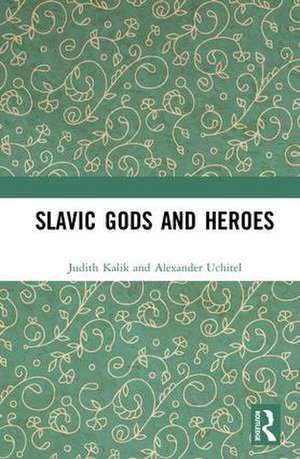Slavic Gods and Heroes
Autor Judith Kalik, Alexander Uchitelen Limba Engleză Hardback – 26 iul 2018
| Toate formatele și edițiile | Preț | Express |
|---|---|---|
| Paperback (1) | 381.00 lei 6-8 săpt. | |
| Taylor & Francis – 30 iun 2020 | 381.00 lei 6-8 săpt. | |
| Hardback (1) | 763.47 lei 6-8 săpt. | |
| Taylor & Francis – 26 iul 2018 | 763.47 lei 6-8 săpt. |
Preț: 763.47 lei
Preț vechi: 1026.98 lei
-26% Nou
Puncte Express: 1145
Preț estimativ în valută:
146.09€ • 152.53$ • 120.91£
146.09€ • 152.53$ • 120.91£
Carte tipărită la comandă
Livrare economică 05-19 aprilie
Preluare comenzi: 021 569.72.76
Specificații
ISBN-13: 9781138493193
ISBN-10: 1138493198
Pagini: 198
Ilustrații: 7 Line drawings, black and white; 2 Tables, black and white
Dimensiuni: 156 x 234 x 15 mm
Greutate: 0.41 kg
Ediția:1
Editura: Taylor & Francis
Colecția Routledge
Locul publicării:Oxford, United Kingdom
ISBN-10: 1138493198
Pagini: 198
Ilustrații: 7 Line drawings, black and white; 2 Tables, black and white
Dimensiuni: 156 x 234 x 15 mm
Greutate: 0.41 kg
Ediția:1
Editura: Taylor & Francis
Colecția Routledge
Locul publicării:Oxford, United Kingdom
Public țintă
PostgraduateCuprins
Contents ;List of Charts ;List of Tables ;Preface ;Introduction;Part One: Ancient Slavs ;1. Ancient Slavs and their Neighbors ; Slavic languages ; Slav's homeland ; Hydromymics ; Names of the Slavs and Slavic names for their neighbors ; Slavic migrations ; Slavic scripts ; Slavic society ; Slavic states ; The Christianization of the Slavs ;2. Earliest Evidence of Slavic Religion ; Procopius, The Gothic War ; St. Boniface, A letter to King Ethelbald of Mercia ; Ahmad ibn Fadlan, Travel-Report; Constantine Porphyrogenitus, De administrando imperio ; Widukind of Corvey, Deeds of the Saxons; Leo the Deacon, History ;3. Conclusions ;Part Two: Gods ;4. Sources ; Documentary evidence ; Bruno of Querfurt, A Letter to King Henry II ; The Magdeburg Charter ; Historiography ;Thietmar of Merseburg, The Chronicle ; Adam of Bremen, History of the Archbishops of Hamburg-Bremen ; Helmold of Bosau, The Chronicle of the Slavs; Saxo Grammaticus, The History of the Danes; The Knytlinga Saga ; The Russian Primary Chronicle ;Hagiography ; The Life of Otto, Apostle of Pomerania; Ebo ; Herbord ; Wolfger of Prüfening ; Poetry ; The Tale of Igor's Campaign ;5. Svarozhich ;6. Sventovit ;7. Rugevit ;8. Porevit, Porenut and Turupid ;9. Pizamar and Chernoglav ;10. Prove and Podaga ;11. Triglav ;12. Gerovit ;13. Pripegala ;14. "Vladimir's Gods";Perun ; Khors ; Dazh'bog (Dazhd'bog) ; Stribog ; Simar'gl ; Mokosh' ;15. Volos (Veles) ;16. Conclusions ;Part Three: Heroes ;17. Sources: Slavic National Historiography ; Cosmas of Prague, The Chronicle of the Czechs ; Gallus Anonymus, The Deeds of the Princes of the Poles ; Wincenty Kadłubek, Chronicles of the Kings and Princes of Poland ; The Chronicle of Great Poland ; The Chronicle of Dalimil ; Jan Długosz, Annals or Chronicles of the Famous ;Kingdom of Poland ;18. Bohemia ; Čech ; Krok ; Kazi ; Tetka ; Libuše ; 19. Little Poland ; Wiślanie ; The Drago of Wawel (Smok Wawelski) ; The Fratricide ; Wanda ; Lędzianie ;. Leszek I ;. Leszek II ; Leszek III ;20. Great Poland; 21. Kiev; 22. Croatia; 23. Reconstruction; Appendix 1: Indo-European Hippomancy ; India ; Persia ; Parthia ; Greece ; Rome ; Germanic Tribes ; Slavs ; Redarii ; Pomerania ; Rani ; Bohemia ; Little Poland ; Ireland ; Reconstruction ;Appendix 2: Zmey Gorynych ;Afterword ;Bibliography ; Index
Notă biografică
Judith Kalik teaches East European history at the Hebrew University of Jerusalem. She has written extensively on the inter-religious encounters in Eastern Europe from the early Middle Ages to the early twentieth century.
Alexander Uchitel taught ancient history at the Hebrew University of Jerusalem and University of Haifa between 1985 and 2017. He is the author of numerous articles on diverse subjects related to the history and philology of ancient Greece and the ancient Near East.
Alexander Uchitel taught ancient history at the Hebrew University of Jerusalem and University of Haifa between 1985 and 2017. He is the author of numerous articles on diverse subjects related to the history and philology of ancient Greece and the ancient Near East.
Descriere
The nature of Slavic pagan religion remains obscure. There is no consensus among scholars, and neo-pagan movements do not supply the demand for objective information. This work is a reexamination of the sources, particularly the medieval chronicles; it deconstructs the Slavic pagan pantheon, and presents Slavic gods as relatively late and artificial constructions, heavily influenced by Christian cultic figures. In parallel, the most ancient of Slavic totemic myths, based on the foundation legends of various Slavic tribes, are reconstructed.
